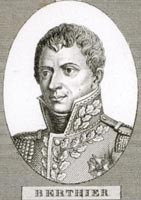Fact file
Born Versailles, 20 November, 1753, died Bamberg (Bavaria), 1 June 1815
‘Fils naturel et légitime' of an ancien régime noble, Jean-Baptiste Berthier, an engineer and geometer
Married Elisabeth of Bavaria in 1808
Trained at the Ecole du Génie d'Auxerre military engineers college
Officer in Rochambeau's headquarters during the American War of Independence – 1780
During the Constituante – Major-General in the garde nationale de Versailles
During the Législative – Maréchal de camp of the Armée du Nord, suspended in 1792 on the fall of the monarchy
During the Convention – re-entered the army in March 1795
During the Directory – in the Armée d'Italie (where in March 1796 as brigadier general and chief of staff he had his first contact with Bonaparte – they were to remain lifelong friends) and the Armée d'Egypte
Ministre de guerre 11 November 1799 to 2 April 1800
Wounded by a bullet in the arm at Marengo, 14 June 1800
8 October 1800 to 9 August 1807
The first of Napoleon's Maréchaux de l'Empire, 1804
Grand veneur 1804
Major-General of the Grande Armée 1805
Served in Austria, Prussia and Poland 1805-1807
Vice-connétable 1807
Prince de Neufchâtel 30 March 1806 and Vallangin
Major-General of the Armée de l'Espagne 3 November, 1808
Major-General of the Armée du Rhin 17 March, 1809
Major-General of the Armée de l'Espagne 1 December, 1809
Prince de Wagram 31 December 1809
Major-General of the Grande Armée in Russia 1 February, 1812 – 13 March 1813
Major-General of the Grande Armée under Napoleon in Germany and later in France, 14 March 1813
Supported the Gouvernement provisoire, 11 April, 1814
Captain of the 5e compagnie de garde de corps, 1 June 1814
Pair de France, 4 June 1814
Commandeur de Saint-Louis, 25 September 1814
An able and talented organiser, Berthier was Napoleon's right-hand man on campaign right up to the Campagne de France in 1814. Always in full dress uniform, as all those under him, Berthier ran headquarters with great efficiency. He was also a tenacious and brave soldier – one of his most distinguished moments was at the battle of Lodi Bridge. Other exploits include being wounded at Marengo and having his horse shot out from under him at Wagram. He was also an excellent diplomat, performing the task of asking on behalf of Napoleon for the hand of Marie-Louise and bringing her back from Vienna to Compiègne with tact and style. Despite being deeply in love with the Marquise Visconti, Napoleon forced Berthier to put that relationship aside and to marry Marie-Elisabeth de Bavaria-Birkenfeld, 30 years his junior. In the latter part of Napoleon's reign Berthier was outstanding during the Russian campaign, notably overseeing the retreat firstly under Murat and subsequently under Eugène de Beauharnais. Injured by being hit on the head with a lance at Brienne in 1814, he rallied to the Bourbons on the fall of the Empire, riding before Louis XVIII's carriage on his return to the First Restoration. During the Hundred Days he accompanied the king to Ostend and was struck off the list of Maréchaux. He then returned to join his family at Bamberg in Bavaria where he was held under house arrest by the allies, so as to prevent him from returning to the Emperor's aid. He died nearly three weeks before Waterloo by falling from a third-storey window in the castle in Bamberg. Since the window had a 4-foot casement, it appears that the death was not an accident. As for whether it was suicide or foul play, the jury is still out.
Further reading
Lentz, T., Dictionnaire des ministres de Napoléon, Paris:Christian/JAS, 1999
Ziesseniss, J., Berthier, Paris: Belfond, 1985


